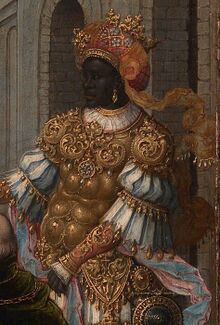Pedro I of Coventrey
| Pedro I | |||||
|---|---|---|---|---|---|
 | |||||
| King of Coventrey (more...) | |||||
| Reign | 12 March 1330 - 11 February 1378 | ||||
| Acclamation | TBA | ||||
| Predecessor | Afonso II | ||||
| Successor | Afonso III | ||||
| Born | 13 November 1314 TBA | ||||
| Died | 11 February 1378 (aged 63) TBA | ||||
| Burial | TBA | ||||
| Spouse | TBA | ||||
| Issue | Afonso III | ||||
| |||||
| House | Stewart | ||||
| Father | Guilherme I | ||||
| Mother | TBA | ||||
| Religion | Coventrian Catholic | ||||
Pedro I of Coventrey nicknamed the the Great (13 November 1314 - 11 February 1378) succeeded his father Afonso II as the 5th King of Coventrey in 1330, reigning until his death in 1378.
Pedro ruled Coventrey for 47 years during which time he reorganized the country's administration, its military, and its political structure. Pedro was remembered internationally for his lavish court and the flourishing of Coventrian culture during nearly half a century of rule. It was believed that at his death in 1378 he was regarded to have been one of the richest men to have ever lived, with much of his revenues being drawn from the gold mines located in the south of his kingdom.
Reign
In 1330, at the death of his father Pedro I succeeded him as King of Coventrey. He was only sixteen so actual rule fell to his mother the Dowager Queen who ruled for him until he turned eighteen, in 1332. In 1340, Pedro began a process of strengthening the kingdom through reforms.
Pedro concerned with the development of the country's economy and infrastructure he encouraged the exploitation of the country's numerous gold, iron and tin, sulphur mines and organized the export of the country's surplus agricultural products, salt, and fish to friendly nations.
In 1348, Pedro contracted the services of an Italian Admiral commanding him take charge over twenty war galleys effectively founding the Coventrian navy.
In 1350, Pedro began the process of the secularization of the royal military orders, the Order of the Tower, the Order of the Stewards, the Order of Saint Francis, a process which would not be completed until the 17th century.
Cultural Pursuits
Pedro established a lavish court at Williamsburg, with the Coventrian capital becoming a centre for learning and the cultural arts. He founded the second oldest university in Coventrey at Salem in 1340 when he granted the institution a royal charter. Pedro being a learned man, spent his leisure reading books, treatises, and ancient manuscripts, even writing a few of his own on topics ranging from government administration to hunting, science and poetry, as well as ordering the translation of many literary works into Coventrian.
At his court he patronized griots, historian musicians who acted as the repository of the country's history and oral tradition. The country's national epic, celebrating the exploits of Mari Djata were first written down during his rule
King Pedro was an avid hunter during his lifetime; a story passed down by the court Griots relates the story of how the king was hunting in the forests outside Santiago when he and his horse were attacked by a lion; the king is said to have killed the beast with a dagger gifted to him by his wife the queen.
Later reign
The last few years of Pedro's long reign were plagued by internal conflicts; with his legitimate heir Afonso openly quarreling with his father's favored son, the bastard Guilherme, Lord of Santiago over royal favor. The rivalry eventually erupted into an open civil war lasting from 1375-1377. While King Pedro and his favored son Guilherme had the support of the higher nobility few others supported them due to the king's policies of favoring nobles at the expense of the townspeople.
These very same people rallied to the cause of Afonso when he declared war on his father in 1375. At first the prince was successful until the tides were turned and the King routed his son's forces and captured him in 1377. Peace was reached only when the Queen begged King Pedro I to spare the life of his son, who was charged with treason. The peace treaty was sealed by the end of 1377, only after his heir swore loyalty to him.
Finally at peace with his son, King Pedro died in 1378, aged 63. At which time his son Afonso became King as Afonso III, his first act being to exile his rival from the kingdom, stripping him of all the lands and fiefdoms bestowed by their father. From exile Guilherme orchestrated a series of attempts to usurp the crown. After he failed several times to invade the kingdom the two brothers signed a peace treaty, arranged by Afonso III's mother the queen.